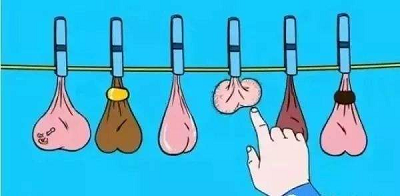Will Seminal Vesiculitis Lead To a Smaller Testicle?
Seminal vesiculitis is a common disease of the male reproductive system, mainly caused by an inflammatory infection within the seminal vesicles, mostly due to retrograde bacterial infection.

One of the most prominent and typical symptoms of seminal vesiculitis is hematospermia, which is the presence of blood in the semen. The severity of seminal vesiculitis can usually be determined by observing the amount of blood contained in the semen.
Generally, bloody semen can be seen with the naked eye and under a microscope. If it can be seen with the naked eye, it means that the seminal vesiculitis is more serious. The presence of bloody semen can also cause the patient to experience painful intercourse, painful ejaculation, and inflammation of the urinary system.
Symptoms of seminal vesiculitis can also manifest in urination, including urinary urgency and frequent and painful urination.
Unlike prostatitis, urination problems caused by seminal vesiculitis are accompanied by burning and tingling sensations in the urethra and sometimes blood in the urine when emptied. After urination, there is a painful sensation around the bladder and perineum.
In addition to the common symptoms, many patients are worried that seminal vesiculitis will cause the testicle to become smaller, thus affecting their normal sexual function and fertility.
So, will seminal vesiculitis lead to a smaller testicle?
Testicular atrophy refers to a reduction in the size of the testicles, which may affect male reproductive function and lead to male infertility. There are many causes of testicular atrophy; the main ones include:
Scrotal Trauma: Atrophy may result when the testicles are struck or injured by an external force.
Testicular Torsion: It is an emergency where the testicle may shrink because of the blocked blood supply.
High Stress Level: Prolonged or severe mental and physical stress may affect testicular function.
Certain Medications: Testicular atrophy can be caused by prolonged use of toxic medications, such as arsenic, or repeated use of androgen-fighting estrogenic drugs, such as astragalol.
Congenital Problems: Certain congenital disorders or genetic factors may lead to abnormal testicular development.
Endocrine Diseases: The testicle, as an endocrine organ, is mainly produced from androgens, and many organs in the body that direct endocrine secretion, such as the pituitary, adrenal glands, thalamus, and so on, and if these appear to be diseases, are very likely to interfere with the function of the testicle, causing testicular atrophy.
So, is there necessarily a link between seminal vesiculitis and testicular atrophy?
Seminal vesiculitis does not directly cause testicular atrophy, but there is a correlation between the two. The inflammation caused by seminal vesiculitis can affect the testicles in several ways:
1. Secondary Infection. The bacterial infection of seminal vesiculitis may spread to the neighboring testicular tissues in severe cases, leading to orchitis, which in turn affects the normal function of the testicles.
2. Immune Response. Inflammation caused by seminal vesiculitis may lead to altered immune responses, causing the body to develop an abnormal immune response to its testicular tissue, impairing testicular function.
Because there are many symptoms of seminal vesiculitis, it greatly impacts men and may lead to testicular atrophy in severe cases. Therefore, early diagnosis and effective treatment of seminal vesiculitis are essential.
For treatment, patients can receive antibiotics treatment. As seminal vesiculitis may lead to orchitis, testicular atrophy, and other lesions, we also suggest using traditional Chinese medicine treatment.
Diuretic and Anti-inflammatory Pill is a traditional Chinese medicine formula developed for male genitourinary system diseases, which can not only eliminate the inflammation of seminal vesicles but also inhibit orchitis and comprehensively regulate patients.
If testicular atrophy is caused by other factors, then patients should take appropriate treatment measures according to the specific situation, such as surgical correction.
In addition, a healthy lifestyle and good living habits help protect the health of the male reproductive system. Regular medical check-ups, safe sexual practices, good personal hygiene, and immune-boosting measures are crucial in preventing and alleviating symptoms.
Recommended Readings:
Is it Helpful for Patients with Seminal Vesiculitis to Massage Their Genitals Regularly?



